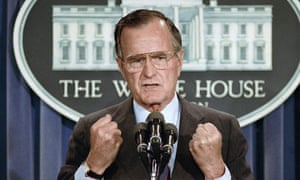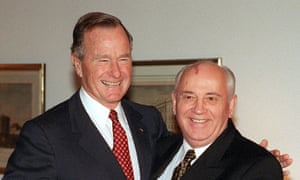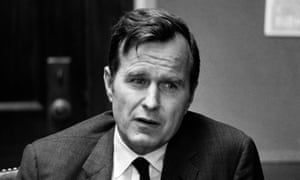
AN EXCELLENT PIECE!
By David Hearst
Link
The words that were to seal Jamal Khashoggi's fate are of no consequence. At the time, Khashoggi himself was unconscious of the danger he was putting himself in.
It was 15 November 2016. Trump had just been elected president and a Washington think-tank was trawling the opinions of journalists and analysts around the Middle East.
The future of the Saudi-US relationship was only one of a number of issues discussed. Speaking from Berlin over Skype to the Washington Institute, Khashoggi contradicted the official line in two parts of his modest five-minute intervention.
"Many of my [Saudi] colleagues and commentators ... see Mr Trump as just another Republican. Republicans are good for Saudi Arabia. I disagree with them. I don't think he is a Republican in that mould. Also my colleagues and many officials say that Trump the president is different from Trump the candidate. Again I tend to disagree with that. The ideas that Trump expressed are deep rooted in his philosophy ... I think Saudi Arabia should be ready for surprises," Khashoggi said.
An existential threat?
Nothing treasonable or seditious there. Nothing that Henry VIII or Ivan The Terrible could baulk at. The identification of Khashoggi as an existential threat to Mohammad bin Salman only makes sense - and even that is understating the madness in his mind - if you knew, which no one did at the time, that the Saudi crown prince and his Emirati tutor, Mohammed bin Zayed, were making extraordinary efforts to cosy up to the incoming president.
Trump was to be the lynchpin not only of the young prince's rise to power at home - he was still only 31 and deputy crown prince - but also of his ambitions to become the next hegemon of the Arab world. No other Saudi voice should be heard in Washington but those who fed out of his lap. If Mohammad bin Salman thought he could buy the president of the United States, Washington would be easy pickings. And it was, for so long.
If Mohammad bin Salman thought he could buy the president of the United States, Washington would be easy pickings
In a column he should never be allowed to forget, the New York Times' Thomas Friedman described Mohammad bin Salman’s plans for his country as "Saudi Arabia's Arab Spring". Within days, the crown prince's right-hand man, Saud al-Qahtani, called Khashoggi up to personally tell him he was off air.
No columns. No tweets, under further notice. Khashoggi was incensed. "What's a thug like him telling me what to do," he later recounted to me. But he complied. At least he was still free to travel, albeit silently. After about a year, Khashoggi had had enough.
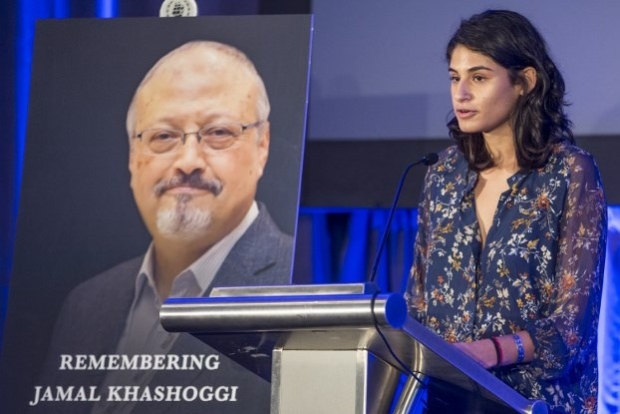 Reporters Without Borders communications officer Noni Ghani speaks during a memorial service for Saudi journalist Jamal Khashoggi on 2 November 2018 in Washington, DC (AFP)
Reporters Without Borders communications officer Noni Ghani speaks during a memorial service for Saudi journalist Jamal Khashoggi on 2 November 2018 in Washington, DC (AFP)
He began writing columns under a pseudonym for the Middle East Eye. Within a few more months, he broke cover and had a column under his own name for the Washington Post. "Journalists have a duty to write, if only to provide a voice to all those who cannot speak openly back home. I am just asking for the minimum. Freedom of speech. I am not a revolutionary, and I hate being called a dissident," Khashoggi told me.
Bleeding uncontrollably
Had he chosen any other capital to go into voluntary exile, I am convinced he would still be alive today. It was Washington that the Saudi crown prince thought he could have all to himself. It was Washington where Khashoggi's plans to launch an NGO campaigning for press freedom in the Arab world was fouling things up.
How fitting then that it's in this same city that Mohammad bin Salman's image is in meltdown. How interesting that it's the CIA - not a Turkish president with a long record of muzzling the press - who is leading the charge.
Alive, the mild-mannered and thoughtful Khashoggi was at best a headache for the aspiring prince. Dead, Khashoggi has become as lethal to the prince's plans as an outbreak of Ebola
How fitting that after all the money, the manipulation, the lobbying, the backchannels, all the power breakfasts, lunches and dinners thrown by Youssef al Otaiba, the Emirati ambassador, that the New Year dawns with trading in Mohammed bin Salman's stock suspended.
Alive, the mild-mannered and thoughtful Khashoggi was at best a headache for the aspiring prince. Dead, Khashoggi has become as lethal to the prince's plans as an outbreak of Ebola. The heir to the Saudi throne is bleeding uncontrollably. No blood influsion - like a handshake with Benjamin Netanyahu - will save this political corpse.
And it's not by any means over. The resolutions of condemnation penned by the outgoing US Congress are largely ceremonial. Despite bipartisan support in the Senate, the GOP-led House of Representatives will let the resolution die by not taking a vote on it. The incoming House is a different matter, not only in its ability to subpoena witnesses but also to pursue legislation aimed at punishing Saudi Arabia.
What the other arm is doing
If attempts to cover up the Saudi involvement in the September 11 attacks produced the Justice Against Sponsors of Terrorism Act (JASTA), we can expect Khashoggi's murder to produce legislation that will bite even harder.
Watch what the CIA does in the next few months. It is pursuing a policy on Saudi Arabia that is very different from the (retreating) line of either Mike Pompeo, the secretary of state, or Trump himself.
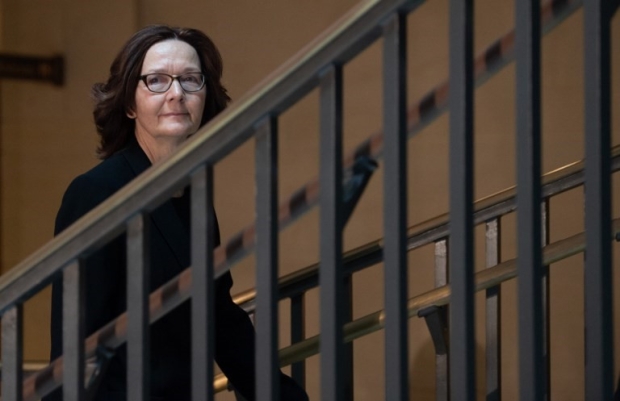 CIA Director Gina Haspel leaves a briefing with US House leaders about the death of journalist Jamal Khashoggi on Capitol Hill in Washington, DC, 12 December 2018 (AFP)
CIA Director Gina Haspel leaves a briefing with US House leaders about the death of journalist Jamal Khashoggi on Capitol Hill in Washington, DC, 12 December 2018 (AFP)
If you have a president who endorsed the Saudi blockade of Qatar, does not know that Doha hosts the US's biggest base in the region, a president who pulls his forces out of Syria against the advice of his last pair of steady hands in the White House, Jim Mattis, then it's no longer in the realms of fiction to suppose that one arm of the US executive may be taking matters into its hands, and say it is doing that to safeguard the US national interest.
If the president himself does not know what the US national interest is, then others might feel empowered to step up to that role.
Fall from grace
Mohammad bin Salman's fall from grace masks a bigger problem for both America and Europe.
Discard for a moment the West's misplaced notions of ideology in the Arab world, or who it considers to be the purveyors of moderate Islam (that turn out to be anything but moderates), or the people the West identifies as reformers, or secularism and Islamism, dictatorship or democracy. Forget values and think only about national interest, about stability of the region in purely utilitarian terms - its ability to stanch migration.
The three biggest economies in the Arab world are, according to GDP, Saudi Arabia, the Emirates and Egypt. Each is suffering major problems.
Saudi Arabia has just posted the biggest budget deficit in its history. Its economy has just shrunk for the first time in nearly a decade. New quotas and fees have triggered an exodus of over 900,000 foreign workers, and foreign direct investment fell from $7.5bn in 2016 to $1.4bn in 2017.
The three biggest economies in the Arab world are, according to GDP, Saudi, the Emiratis and Egypt. Each is suffering major problems
Feuds with Germany and Canada and the lawless imprisonment and expropriation of the assets of Saudi's richest princes and businessmen in two Riyadh hotels have turned the trickle of money fleeing the kingdom into a flood - at the last count $80bn left last year.
In the UAE, Dubai is having real problems. There is a slump in property and construction, which account for over 13 per cent of Dubai's gross domestic product. Dubai's stock market has lost a quarter of its worth.
In Egypt, as a result of massive mismanagement, grand construction ventures, and the total dominance of the army in the country’s economy, the government's foreign debts are rising out of control, with foreign debts almost doubled since 2015. The interest payments on Egypt's debts now total around $30bn a year, 38 percent of the government's budget for 2018-19. Shortages are now becoming commonplace. In the last six months Egypt has had a potato shortage and water scarcity.
The time bomb
In the poorest Arab nations, Sudan, Jordan and Tunisia, there are major protests at rising prices and taxes. Protests are sweeping across Sudan over the rising cost of bread and fuel. Protesters set the offices of the ruling National Conference Party on fire in Atbara, north of the capital Khartoum.
In Jordan, people are on the streets again at planned increases in taxes after mass demonstrations forced the resignation of the prime minister in the spring.
 A Jordanian protester chants slogans in the capital Amman, on 13 December 2018, during a demonstration against the government's decision to raise income tax (AFP)
A Jordanian protester chants slogans in the capital Amman, on 13 December 2018, during a demonstration against the government's decision to raise income tax (AFP)
The time bomb that is ticking away under all of these countries is youth unemployment. Official youth unemployment rates, let alone the real ones, are at 21 per cent in the Middle East and 25 per cent in North Africa. In Tunisia, Algeria and Morocco unemployment rates run close to 30 percent.
The traditional engines of the Arab economy - Saudi Arabia, Egypt and Algeria - are either spluttering with the fall of the price of oil or have broken down entirely. Corrupt autocrats, the army and their elites have no clue nor any real wish to serve their people.
The conditions which fomented the Arab uprisings in 2011 are even stronger eight years later
The conditions which fomented the Arab uprisings in 2011 are even stronger eight years later. The difference eight years on is that the region is incomparably weaker to absorb the shock of social conflict. Three Arab countries - Syria, Yemen and Libya - are failed states.
With the demise of all international structures, in particular the Gulf Cooperation Council (GCC) and the Arab League, there is no Arab consensus that can bind the region together.
Trump's fate
But there is much else that can inflame the Arab street. 2018 was the year when the right wing in Israel felt unleashed by the removal of the convention of having to get America's okay for each new expansion of the State of Israel. The US ambassador said as much himself. In an interview published in the daily Israel Hayom, David Friedman said Israel "shouldn't have to ask permission from the US" to build settlements in the occupied West Bank.
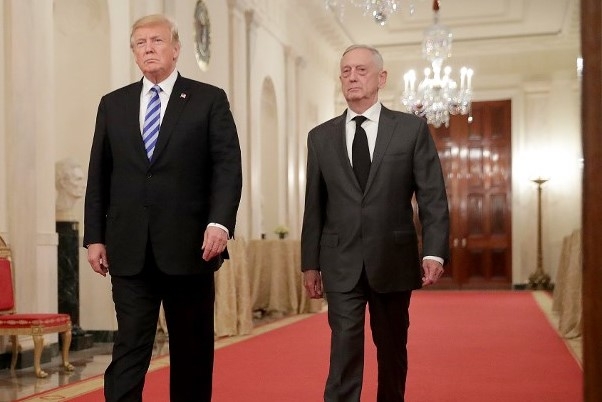 President Donald Trump announced that Defense Secretary Jim Mattis is retiring this coming February and he will announce his replacement soon, 20 December, 2018 (AFP)
President Donald Trump announced that Defense Secretary Jim Mattis is retiring this coming February and he will announce his replacement soon, 20 December, 2018 (AFP)
Prime Minister Benjamin Netanyahu was set free by Trump to take East Jerusalem, the right of return and even the nine-tenths of Palestinian refugees themselves "off the table". 2019 will be the year when they start expelling non-Jewish Israeli citizens to the West Bank. A billexpelling the families of Palestinian assailants to the West Bank has just passed its first reading in the Knesset.
Much depends on the fate of Trump himself. He and his circle of Middle East despots are now tethered together. Loosen the bonds and it is every despot for himself. If Khashoggi’s murder sent shock waves through Sisi's Egypt - and it did - Trump's decline will leave each and every despot vulnerable to a palace coup back home.
Much depends on the fate of Trump himself. He and his circle of Middle East despots are now tethered together. Loosen the bonds and it is every despot for himself
I would like to think that Mattis' departure is the beginning of the end of Trump, and that Khashoggi's brutal murder will spell the end of Mohammad bin Salman, but I'm not here to indulge in wishful thinking.
The failure of the Arab state
What really needs to change is the policy itself. It has become more of a default position. When push comes to shove, all the Arab world's former colonial masters and Israel will back the despot. The worse the despot behaves the more Western governments will try to save his back, as the UK is currently doing with the Saudi crown prince.
The more chaos the despot causes, the stronger the fear of instability from an alternative.
We cannot keep shrugging our shoulders and turn the other way, as Barack Obama did after the massacre of Rabaa Square in Cairo. Human Rights Watch called it the worst massacre of unarmed civilians since Tiananmen Square. Obama returned to his game of golf.
READ MORE ►
Europe has to understand that Egypt's President Sisi, Mohammad bin Salman, and Abdelaziz Bouteflika in Algeria are eminently capable of sending millions of impoverished and desperate Arabs northwards. Is it ready for that? The Islamic State is just a symptom of the disease of the failure of the Arab state. The cause is all around us.
Until the West learns that this disease can be cured only by political reform, by transparency and democracy, it is doomed to await the next explosion. And this time, it could be a big one. Khashoggi's life’s work is not done yet.
In killing Khashoggi, and it should have been obvious before that with his war in Yemen, Mohammad bin Salman revealed his true place in the Arab world. He and his like are not sources of stability. His are not a safe pair of hands. If you cannot trust him with a bone saw, what would he do with nuclear fuel? If you cannot trust him as crown prince, what would he be like as king?
- David Hearst is editor-in-chief of Middle East Eye. He was chief foreign leader writer of The Guardian, former associate foreign editor, European editor, Moscow bureau chief, European correspondent, and Ireland correspondent. He joined The Guardian from The Scotsman, where he was education correspondent.



